Baking Soda for Erectile Dysfunction: Benefits, Uses, and Effects on Sexual Health
Written by Dr. Deepali Anand

Dr. Deepali is a medical writer and healthcare professional with a background in clinical surgery and patient care. Having transitioned from active clinical practice to medical communications, she specializes in bridging the gap between complex clinical data and patient education. Dr. Deepali is dedicated to creating evidence-based content that is grounded in scientific rigor and empathy, ensuring that sensitive topics like sexual wellness and mental health are accessible and empowering for every reader.
•
September 19, 2025
Our experts continually monitor the health and wellness space, and we update our articles when new information becomes available.
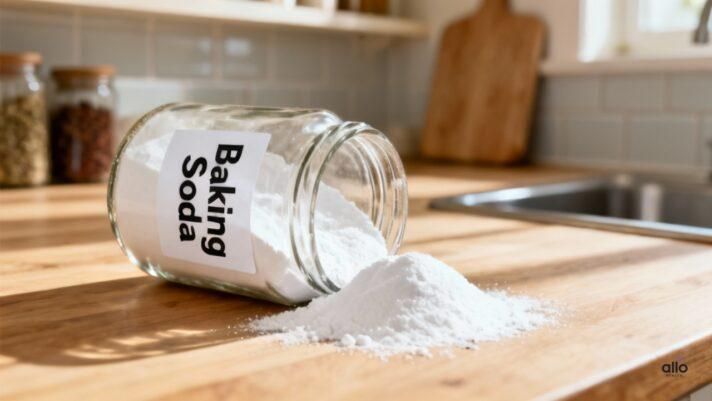
Quick Read
No, baking soda cannot help with erectile dysfunction. Despite online claims suggesting its alkaline properties might improve blood flow or balance body pH, there's absolutely no scientific evidence supporting baking soda as an ED treatment. In fact, using baking soda for this purpose can be dangerous, potentially causing high blood pressure, stomach problems, and dangerous electrolyte imbalances due to its extremely high sodium content. Erectile dysfunction is a complex medical condition that requires proper diagnosis and proven treatments like FDA-approved medications, lifestyle changes, or other evidence-based therapies. If you're experiencing ED, skip the unproven home remedies and consult a healthcare provider for safe, effective treatment options.
Baking soda and erectile dysfunction often get linked in online health tips, but let’s set the record straight: there is no scientific evidence that baking soda can improve erections or treat ED.
While some claims suggest its alkaline nature could boost blood flow or balance the body’s pH, the reality is that erectile dysfunction is a complex medical condition that needs proper diagnosis and treatment.
In this article, we’ll explore where these baking soda theories come from, what research actually shows, the potential risks of trying it, and, most importantly, the safe, proven alternatives that can truly support your sexual health.
Allo asks
Do you believe baking soda can improve erections?
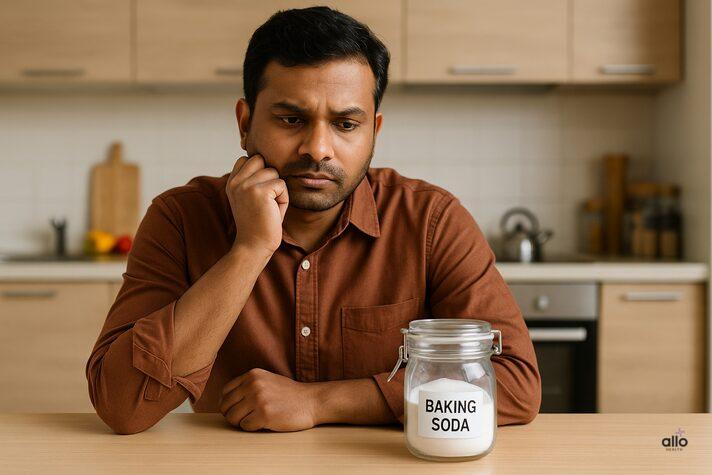
Can Baking Soda Improve Erections?
Many claims circulate online about using baking soda for erections, but the reality is different. There is no scientific evidence to support baking soda as a treatment for erections or erectile dysfunction. In fact, self-treating ED with baking soda may not only be ineffective but could also cause harmful side effects and health complications.
The idea behind this remedy usually points to baking soda’s alkaline nature. But erectile dysfunction is a complex medical condition with multiple causes, from poor heart health and hormonal imbalances to psychological factors like stress or anxiety.
Managing erectile dysfunction often requires a personalized treatment plan, which can include lifestyle changes, counseling, or medically approved treatments. Baking soda is not one of them and should not be considered a safe or effective option.
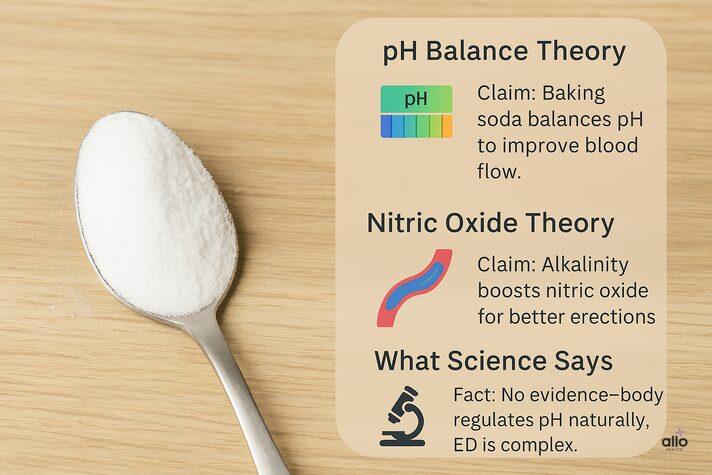
The Theory Behind Baking Soda and Erectile Dysfunction Connection
Supporters of the baking soda–erectile dysfunction connection believe that drinking a mixture of baking soda and water might help improve erections. The two main ideas often shared online are:
pH Balance Theory:
This claim suggests that baking soda’s alkaline properties can rebalance the body’s pH levels. A more “alkaline” body, they argue, could create an environment that supports sexual function by improving blood flow.
Nitric Oxide Theory:
Some people believe that alkalizing the body with baking soda can boost the production of nitric oxide. This molecule relaxes blood vessels and improves blood flow, which is essential for erections.
What Science Actually Says
These ideas remain unproven claims. There is no scientific evidence that baking soda improves erections or treats erectile dysfunction. In reality, the human body naturally regulates its pH levels regardless of what you eat or drink. Erectile dysfunction is far more complex than just a blood flow issue caused by a pH imbalance.
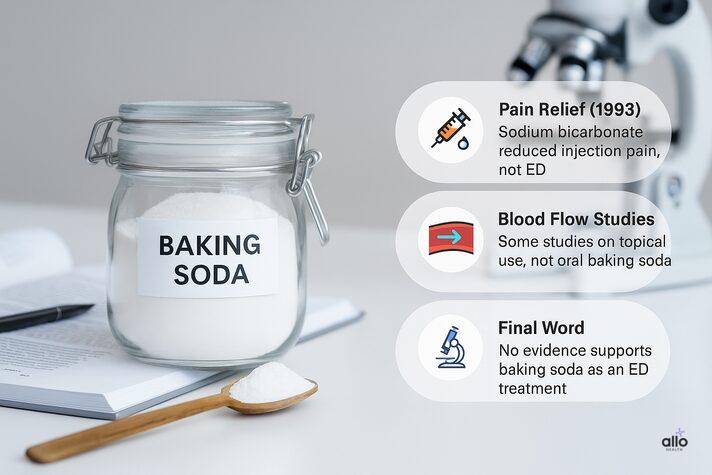
What Science Says on Baking Soda-Erectile Dysfunction Connection
Currently, there is very limited research linking baking soda (sodium bicarbonate) to sexual health. The few studies available focus on specific medical applications of sodium bicarbonate, not on its use as a general treatment for erectile dysfunction.
Pain Relief after Penile Injections
The only documented connection between sodium bicarbonate and erectile dysfunction treatment comes from a 1993 study[1]. In this research, sodium bicarbonate was added to injection medicines used for ED. The result: it helped reduce penile pain by neutralizing the acidity of the medication.
However, this is completely different from drinking or taking baking soda as a treatment for ED.
Research on Blood Flow
Some studies[2] have studied how bicarbonate might affect blood flow by increasing nitric oxide production. But these studies focused on topical application, like bathing, and not on oral use of baking soda for erectile dysfunction.
Final Word From Science
So far, there is no scientific foundation for the claims surrounding baking soda and erection health. While sodium bicarbonate has its place in medicine, using it as a home remedy for erectile dysfunction is unsupported and potentially unsafe.
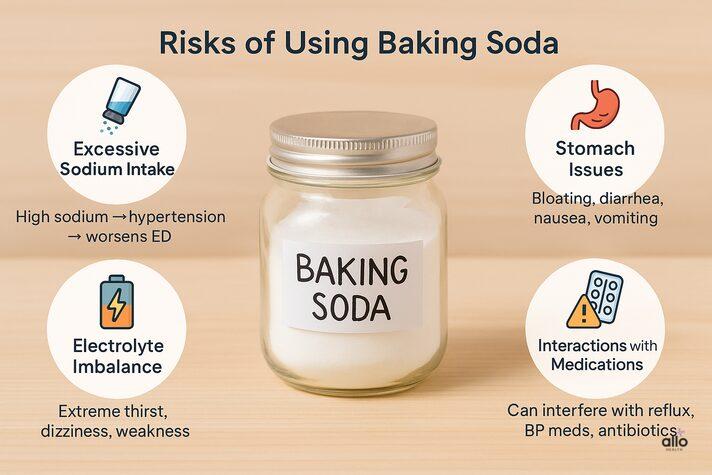
Risks of Using Baking Soda for Erectile Dysfunction
Is baking soda safe for ED? The answer is no. Using baking soda as a remedy for erectile dysfunction can pose several serious health risks. Some common side effects of baking soda include:
Excessive Sodium Intake
Baking soda is extremely high in sodium. Just one teaspoon contains around 1,260 mg of sodium - more than half of the WHO’s daily recommended limit of 2,000 mg.
High sodium intake can raise blood pressure (hypertension), put strain on the heart, and in the long run, may actually worsen erectile dysfunction instead of improving it.[3]
Metabolic Alkalosis
Taking too much baking soda can disrupt the body's delicate acid-base balance. This creates a dangerous condition called metabolic alkalosis[4], where the blood becomes too alkaline.
Symptoms of metabolic alkalosis include:
- Nausea and vomiting
- Weakness and muscle spasm
- Confusion
- Irregular heartbeat
- Can eventually lead to death
Stomach Issues(Gastrointestinal Problems)
Taking baking soda can lead to stomach problems such as:
- Diarheea
- Bloating
- Nausea and vomiting
Studies[5] show that 91% of participants taking sodium bicarbonate all these stomach issues, which is definitely not a favourable environment for sexual activity.
Electrolyte Imbalance
Excessive baking soda use can disturb the body’s electrolyte levels, causing:
- Extreme thirst
- Lightheadedness
- Fatigue
- In severe cases, dangerous complications involving heart and kidney disease.
Interactions with Medications
Baking soda may also interfere with common medications, including those for:
- Acid reflux
- High blood pressure
- Certain antibiotics
This makes unsupervised use of baking soda even riskier.
Trying baking soda for ED isn’t just unhelpful, it can actually be harmful. High sodium levels can raise blood pressure and make erectile problems worse over time

What You Can Actually Do If You Have ED
The first step in treating and managing erectile dysfunction is to see a doctor. A medical evaluation will help identify the root cause of your ED and allow your doctor to create a personalized treatment plan that works best for you.
Remember, ED is a medical condition, and the safest, most effective results come from evidence-based care and not unproven remedies like baking soda.
Proven Alternatives to Baking Soda for Erectile Dysfunction
1. Oral Medications
Oral ED medications, known as PDE5 inhibitors, are often the first-line treatment for erectile dysfunction. Common options include:
- Sildenafil (Viagra)
- Tadalafil (Cialis)
- Vardenafil (Levitra)
- Avanafil (Stendra)
These medications improve blood flow to the penis, making it easier to achieve and maintain an erection.
2. Lifestyle Modifications
Healthy lifestyle choices can make a big difference in erectile function. Examples include:
- Eating a balanced diet for ED rich in fruits, vegetables, and whole grains
- Regular physical activity, including pelvic floor exercises
- Managing stress through relaxation techniques or mindfulness
- Quitting smoking
- Limiting alcohol intake
3. Advanced Treatments
For men who cannot take ED medications or who don’t respond to them, there are several advanced treatment options with proven effectiveness:
4. Counseling and Therapy
For cases involving psychogenic ED or ED due to performance anxiety, working with a trained therapist or engaging in sex therapy can be very effective. These approaches help address the root causes and reduce the mental burden of ED.
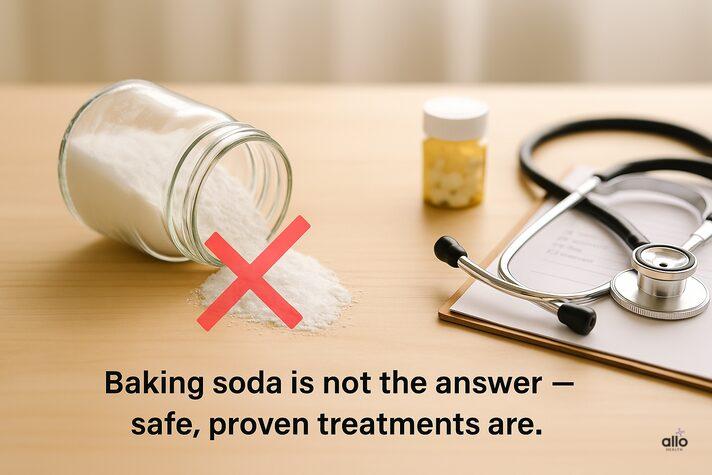
Bottom Line
Baking soda and erectile dysfunction are not connected, and baking soda is not an effective treatment for ED. In many cases, erectile dysfunction is actually a sign of an underlying health condition, such as heart disease, diabetes, or hormonal imbalance, and should be properly evaluated by a doctor.
If you’re experiencing erection issues, don’t shy away from speaking up. Avoid relying on internet-promoted “natural remedies for erectile dysfunction” like baking soda, which have no scientific basis and may cause more harm than good. Instead, seek professional help and focus on proven, safe treatments that truly support your sexual health.
Disclaimer
The following blog article discusses food and diet-related information for general educational purposes. However, it is important to note that the information provided is not intended as personalized dietary advice and should not be considered a substitute for professional guidance from a registered dietitian or qualified healthcare professional. Before making any significant changes to your diet or nutrition plan, it is recommended to consult with a registered dietitian or healthcare professional. Dietary changes can have a significant impact on your overall health and well-being. It is important to approach any changes to your diet in a balanced and sustainable manner, ensuring that you meet your nutritional needs and avoid any potential nutrient deficiencies. Rapid or extreme changes in dietary patterns can be detrimental to your health and may require professional guidance. It is crucial to note that any specific dietary recommendations or guidelines mentioned in this article may not be appropriate for individuals with specific medical conditions, allergies, or intolerances. A registered dietitian or healthcare professional can provide individualized advice, including modifications or alternative food choices to accommodate your unique circumstances. The information provided in this article may not encompass all possible dietary considerations or account for the latest research and nutritional guidelines.
Most Asked Questions
Can baking soda really treat erectile dysfunction?
No. There is no scientific evidence that baking soda can treat ED. It may even cause health risks if taken in large amounts. ED usually requires proper medical evaluation and treatment.
Why do people think baking soda helps with erections?
Some online claims suggest that baking soda’s alkaline nature can improve blood flow or balance pH levels. However, the body already regulates its pH tightly, and these claims are not supported by science.
Is it safe to drink baking soda for erectile dysfunction?
Not really. Drinking baking soda can lead to high sodium intake, stomach problems, and even dangerous conditions like metabolic alkalosis. It’s not recommended as an ED remedy.
What are safer alternatives to baking soda for ED?
Evidence-based options include oral ED medications (like Viagra or Cialis), lifestyle changes (exercise, diet, stress management), and advanced treatments. The right choice depends on the cause of ED.
When should I see a doctor for erectile dysfunction?
If erection problems persist for more than a few weeks, or if they interfere with your confidence or relationships, it’s important to consult a doctor. ED can sometimes signal underlying health issues like heart disease or diabetes.
Sources
- 1.
Sodium bicarbonate alleviates penile pain induced by intracavernous injections for erectile dysfunction
- 2.
The effects of bathing in neutral bicarbonate ion water
- 3.
Sodium Intake and Hypertension
- 4.
Hemorrhagic Encephalopathy From Acute Baking Soda Ingestion
- 5.
Sex-dependent responses to acute sodium bicarbonate different dose treatment: A randomized double-blind crossover study


